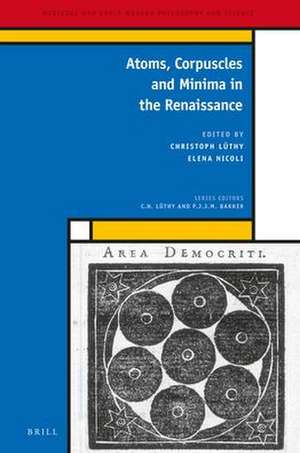Atoms, Corpuscles and Minima in the Renaissance: Medieval and Early Modern Philosophy and Science, cartea 36
Christoph Lüthy, Elena Nicolien Limba Engleză Hardback – 2 noi 2022
Din seria Medieval and Early Modern Philosophy and Science
- 5%
 Preț: 1424.85 lei
Preț: 1424.85 lei - 18%
 Preț: 1027.54 lei
Preț: 1027.54 lei - 18%
 Preț: 667.76 lei
Preț: 667.76 lei - 18%
 Preț: 550.16 lei
Preț: 550.16 lei - 18%
 Preț: 682.58 lei
Preț: 682.58 lei - 18%
 Preț: 892.75 lei
Preț: 892.75 lei - 18%
 Preț: 897.34 lei
Preț: 897.34 lei - 18%
 Preț: 660.80 lei
Preț: 660.80 lei - 18%
 Preț: 870.96 lei
Preț: 870.96 lei - 18%
 Preț: 636.54 lei
Preț: 636.54 lei - 18%
 Preț: 633.03 lei
Preț: 633.03 lei - 18%
 Preț: 664.38 lei
Preț: 664.38 lei - 18%
 Preț: 678.67 lei
Preț: 678.67 lei - 18%
 Preț: 869.81 lei
Preț: 869.81 lei - 18%
 Preț: 584.93 lei
Preț: 584.93 lei - 18%
 Preț: 765.48 lei
Preț: 765.48 lei - 18%
 Preț: 852.65 lei
Preț: 852.65 lei - 18%
 Preț: 794.99 lei
Preț: 794.99 lei - 18%
 Preț: 671.39 lei
Preț: 671.39 lei - 18%
 Preț: 600.74 lei
Preț: 600.74 lei - 18%
 Preț: 804.34 lei
Preț: 804.34 lei - 18%
 Preț: 838.37 lei
Preț: 838.37 lei - 18%
 Preț: 632.01 lei
Preț: 632.01 lei - 18%
 Preț: 656.41 lei
Preț: 656.41 lei - 18%
 Preț: 679.74 lei
Preț: 679.74 lei - 18%
 Preț: 683.64 lei
Preț: 683.64 lei - 18%
 Preț: 900.53 lei
Preț: 900.53 lei - 18%
 Preț: 718.99 lei
Preț: 718.99 lei - 18%
 Preț: 723.42 lei
Preț: 723.42 lei - 18%
 Preț: 716.18 lei
Preț: 716.18 lei
Preț: 752.04 lei
Preț vechi: 917.12 lei
-18% Nou
Puncte Express: 1128
Preț estimativ în valută:
143.90€ • 150.63$ • 119.77£
143.90€ • 150.63$ • 119.77£
Carte indisponibilă temporar
Doresc să fiu notificat când acest titlu va fi disponibil:
Se trimite...
Preluare comenzi: 021 569.72.76
Specificații
ISBN-13: 9789004528918
ISBN-10: 9004528911
Pagini: 316
Dimensiuni: 155 x 235 mm
Greutate: 0 kg
Editura: Brill
Colecția Brill
Seria Medieval and Early Modern Philosophy and Science
ISBN-10: 9004528911
Pagini: 316
Dimensiuni: 155 x 235 mm
Greutate: 0 kg
Editura: Brill
Colecția Brill
Seria Medieval and Early Modern Philosophy and Science
Notă biografică
Christoph Lüthy, Ph.D. (1995) is Professor of the History of Philosophy and Science at Radboud University, Nijmegen (The Netherlands). His publications concern mainly the history of matter theories and the development and logic of ‘epistemic images’.
Elena Nicoli, Ph.D. (2017) is an Associate Researcher at the Center for the History of Philosophy and Science at Radboud University, Nijmegen (The Netherlands). Her research and publications mainly concern the reception of Lucretius and Epicureanism in the Renaissance.
Elena Nicoli, Ph.D. (2017) is an Associate Researcher at the Center for the History of Philosophy and Science at Radboud University, Nijmegen (The Netherlands). Her research and publications mainly concern the reception of Lucretius and Epicureanism in the Renaissance.
Cuprins
Contents
List of Illustrations
Notes on Contributors
1 Atoms, Corpuscles, and Minima in the Renaissance: An Overview
Christoph Lüthy and Elena Nicoli
2 Atomism in Sixteenth-Century Italian Commentaries on Lucretius
Elena Nicoli
3 Galenic Medicine and the Atomist Revival: Elements, Particles, and Minima in Late Renaissance Physiology
Elisabeth Moreau
4 Pores, Parts, and Powers in Sixteenth-Century Commentaries on Meteorologica IV
Craig Martin
5 Atoms, Corpuscles, and Minima in the Renaissance: The Case of Nicolaus Biesius (1516–1573)
Christoph Lüthy
6 Mechanical Arts and Biological Development on the Sixteenth-Century World Stage: The Paracelsian Mechanical Philosophy of Petrus Severinus
Jole Shackelford
7 Democritus in Francesco Patrizi and Giordano Bruno
Leen Spruit
8 Nicholas Hill, an English Atomist
Sandra Plastina
9 Finite God and Infinite Space: Conrad Vorstius and David Gorlaeus
Kuni Sakamoto
10 Atomism, Mechanism, and Chymistry in the Natural Philosophy of Walter Warner
Stephen Clucas
11 Isaac Newton’s Atomist Sources: The Case of Bernhard Varenius
William R. Newman
Bibliography
Index
List of Illustrations
Notes on Contributors
1 Atoms, Corpuscles, and Minima in the Renaissance: An Overview
Christoph Lüthy and Elena Nicoli
2 Atomism in Sixteenth-Century Italian Commentaries on Lucretius
Elena Nicoli
3 Galenic Medicine and the Atomist Revival: Elements, Particles, and Minima in Late Renaissance Physiology
Elisabeth Moreau
4 Pores, Parts, and Powers in Sixteenth-Century Commentaries on Meteorologica IV
Craig Martin
5 Atoms, Corpuscles, and Minima in the Renaissance: The Case of Nicolaus Biesius (1516–1573)
Christoph Lüthy
6 Mechanical Arts and Biological Development on the Sixteenth-Century World Stage: The Paracelsian Mechanical Philosophy of Petrus Severinus
Jole Shackelford
7 Democritus in Francesco Patrizi and Giordano Bruno
Leen Spruit
8 Nicholas Hill, an English Atomist
Sandra Plastina
9 Finite God and Infinite Space: Conrad Vorstius and David Gorlaeus
Kuni Sakamoto
10 Atomism, Mechanism, and Chymistry in the Natural Philosophy of Walter Warner
Stephen Clucas
11 Isaac Newton’s Atomist Sources: The Case of Bernhard Varenius
William R. Newman
Bibliography
Index
